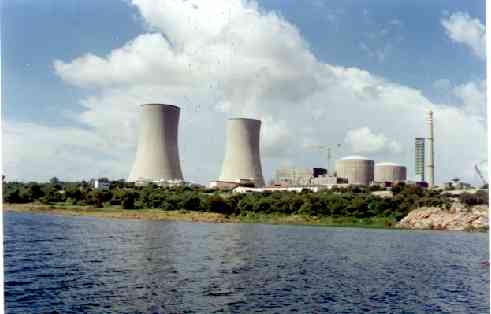More than 40 workers exposed to tritium radiation in two separate nuclear events in India

More than 40 workers at a nuclear power station in northern India have been exposed to tritium radiation in two separate leaks in the past five weeks. The first accident occurred on June 23, 2012 when 38 people were exposed during maintenance work on a coolant channel at the Rajasthan Atomic Power Station in Rawatbhata, senior plant manager Vinod Kumar said.
Two of them received radiation doses equivalent to the annual permissible limit, he said, but all those involved have returned to work.
In a second incident last Thursday, July 20, 2012 another four maintenance workers at the plant were exposed to tritium radiation while they were repairing a faulty seal on a pipe. India is on a nuclear power drive, with a host of plants based on Russian, Japanese, American and French technology under consideration or construction.
The country’s growing economy is currently heavily dependent on coal, getting less than 3% of its energy from its existing atomic plants, and the government hopes to raise the figure to 25% by 2050. But environmental watchdogs have expressed concerns about safety in India, where small-scale industrial accidents due to negligence or poor maintenance are commonplace and regulatory bodies are often under-staffed and under-funded.
The director of the Rajasthan power station, C.P. Jamb, confirmed the second accident to AFP but said the radiation was within permissible limits and posed no health threat. “The workers were exposed to radiation from 10 to 25 per cent of the annual limit,” Jamb said. “Such minor leakages keep on happening but they cause no harm.” C.D. Rajput, director of the unit where the leak happened, also said the radiation exposure “was well under the limits and all the workers are working normally”. No explanation was immediately available as to why the first incident at the plant took a month to emerge.
Tritium radiation highlights (NRC)
- Tritium is almost always found as tritiated water and primarily enters the body when people eat or drink food or water containing tritium or absorb it through their skin. People can also inhale tritium as a gas in the air.
- Once tritium enters the body, it disperses quickly and is uniformly distributed throughout the soft tissues. Half of the tritium is excreted within approximately 10 days after exposure.
- Everyone is exposed to small amounts of tritium every day, because it occurs naturally in the environment and the foods we eat. Workers in Federal weapons facilities; medical, biomedical, or university research facilities; or nuclear fuel cycle facilities may receive increased exposures to tritium.
- Tritium is present naturally in the environment and the radiation produced by natural tritium is identical to the radiation produced by tritium from nuclear power plants.
- The radiation dose from tritium can be directly compared to the radiation dose from any other type of radiation, including natural background radiation and those received during medical procedures.
- The tritium dose from nuclear power plants is much lower than the exposures attributable to natural background radiation and medical administrations.
- Humans receive approximately 50% of their annual radiation dose from natural background radiation, 48% from medical procedures (e.g., x-rays), and 2% from consumer products.
Source: RSOE

Commenting rules and guidelines
We value the thoughts and opinions of our readers and welcome healthy discussions on our website. In order to maintain a respectful and positive community, we ask that all commenters follow these rules:
We reserve the right to remove any comments that violate these rules. By commenting on our website, you agree to abide by these guidelines. Thank you for helping to create a positive and welcoming environment for all.